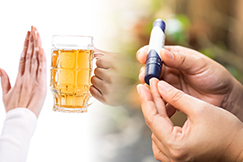NCD Watch
Does Alcohol Cause Diabetes?
9 Nov 2020 (Mon)
 Diabetes is a common chronic condition that occurs when the pancreas cannot produce any or enough insulin (a hormone which helps glucose get into the cells for use), or the body cannot use insulin effectively, leading to elevated levels of blood glucose. The risk of developing diabetes may depend on a mix of one’s genes and lifestyle (e.g. unhealthy diet and insufficient physical activity). Alcohol is also one of the behavioural risk factors that can affect some body functions and induce diabetes. Alcohol consumption by diabetes can also worsen medical conditions in those patients.
Diabetes is a common chronic condition that occurs when the pancreas cannot produce any or enough insulin (a hormone which helps glucose get into the cells for use), or the body cannot use insulin effectively, leading to elevated levels of blood glucose. The risk of developing diabetes may depend on a mix of one’s genes and lifestyle (e.g. unhealthy diet and insufficient physical activity). Alcohol is also one of the behavioural risk factors that can affect some body functions and induce diabetes. Alcohol consumption by diabetes can also worsen medical conditions in those patients.
In Hong Kong, both diabetes and harmful alcohol use are important public health issues. The Population Health Survey 2014/15 of the Department of Health (DH) observed that the overall prevalence of diabetes among Hong Kong’s people aged 15–84 was 8.4%, with more than half (54.1%) of them being undiagnosed before the survey. Besides, the Health Behaviour Survey 2018/19 of DH indicated that around one-fifth (20.1%) of the Hong Kong’s people aged 15 or above drank alcoholic beverages occasionally (i.e. drank in three days or less a month) and almost one-tenth (8.8%) drank regularly (i.e. drank at least once a week) in the 12 months preceding the survey.
Alcohol is a toxic substance with direct and indirect effects on various body organs and systems. The International Agency for Research on Cancer of the World Health Organization has also classified alcohol as carcinogenic to humans (Group 1), the same category as tobacco smoke, ionising radiation and asbestos, causing various types of cancers. Concerning cancer-causing effect, there is no safety level for drinking.
Alcohol can affect carbohydrate metabolism in the liver and affect blood glucose level, and it is extremely calorific but has no nutritional value. Each gram of alcohol contains 7 kilocalories, which is almost twice as many calories as carbohydrates (e.g. sugar) or proteins do (both contain 4 kilocalories per gram). A glass of regular beer (250 ml, 5% alcohol by volume) contains about 108 kilocalories, and a glass of red or white wine (125ml, 12% alcohol by volume) contains about 104 kilocalories, which are equivalent to the calories of approximately 2 teaspoons of oil respectively. So drinking alcohol can increase the chance of becoming obese which raises the risk of developing diabetes.
The best option for lowering the risk of getting diabetes and other diseases is no drinking at all.